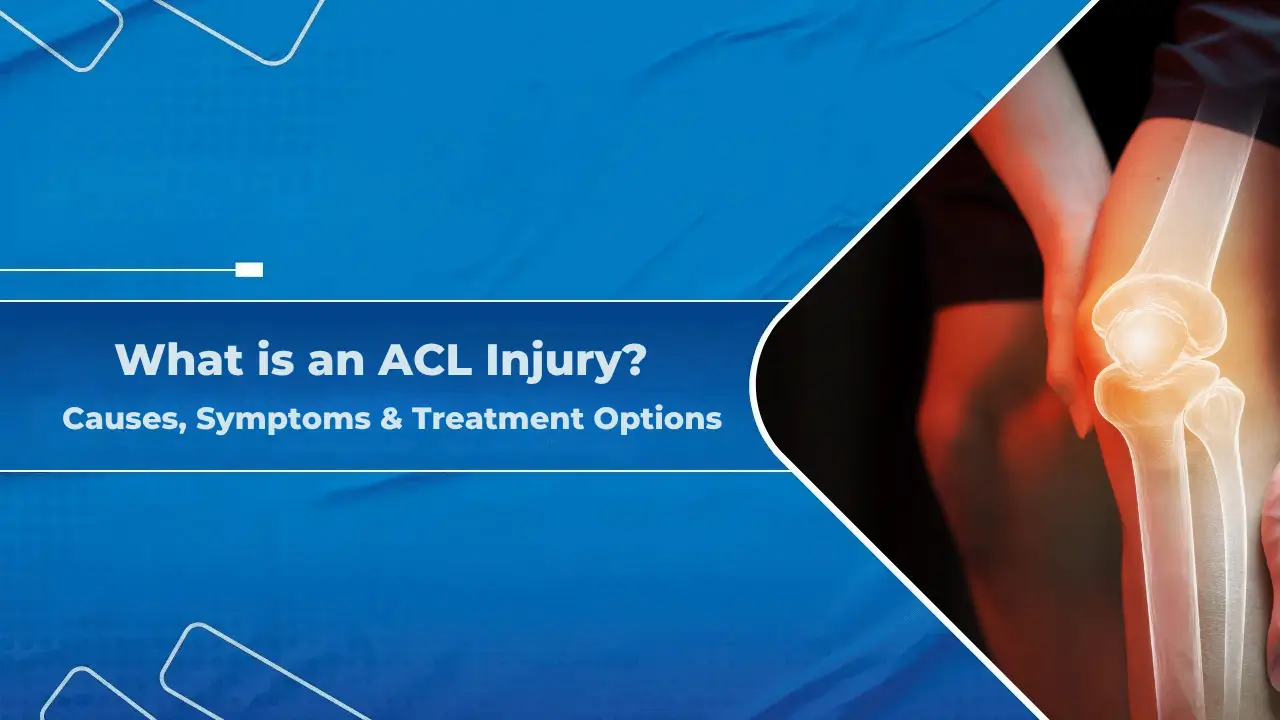
An ACL (Anterior Cruciate Ligament) injury is one of the most common knee problems. Athletes or people with physically active lifestyles are at the highest risk of getting an ACL tear. That being said, ACL injuries are a result of accidents, and accidents can happen to anyone. You can suffer an ACL injury even during regular activities such as climbing stairs or walking on uneven ground.
In this blog, we’re going to dissect what an ACL injury is, its causes, symptoms, and treatment options.
What is an ACL Injury?
The ACL is one of the four primary ligaments in the knee. It is the ligament that connects the thigh bone (femur) to the shin bone (tibia) and helps in the stabilisation of the knee during any type of movement. Overstretching or overstraining this ligament can lead to an ACL injury.
Typically, people who actively take part in regular physical activities such as dance or sports that involve swift movements, extreme stretching, sudden direction changes, jumping, or abrupt stops (for instance, break dance, ballet, basketball, football, rugby, etc.) are at a higher risk of getting their ACL torn.
However, accidents do happen randomly, so you can suffer an injury even with something as minor as a fall or climbing stairs the wrong way.
ACL Injury Causes
People who have weak hip or thigh muscles, poor balance in general, or wear improper footwear are more susceptible to ACL injuries. Understanding what causes ACL injuries can act as the first step towards prevention. Below is a list of some common causes of ACL injuries:
- Abrupt stops or changes in trajectory
- Falls, slips, and twisting of the knee joint
- Landing incorrectly after a jump
- Collisions during contact sports
ACL Injury Symptoms
Early detection of symptoms plays a huge role in recovery. In case you’re wondering how to recognise the symptoms of an injury as an ACL tear, here are some common signs to look out for:
- A ‘pop’ sound at the time of injury
- Instability in the knee
- Almost instantaneous swelling in the knee
- Excruciating pain; inability to put weight on the injured leg
- Stiffness in the injured leg
While some people may still be able to walk after their injury, if you have suffered an ACL tear, your knee will feel wobbly or unstable. Additionally, even if your pain subsides, an undiagnosed and untreated ACL injury can lead to severe long-term knee problems.
ACL Injury Diagnosis
Speaking of early detection, if you suspect you’ve suffered an ACL tear, it’s crucial to visit a specialist. You can book an appointment at Sohana Hospital and consult the best orthopaedic doctor in Chandigarh. A thorough examination is key to a quick and smooth recovery.
Here’s what you can expect when you visit an orthopaedist:
- Physical assessment (Lachman test)
- Imaging tests (MRI, X-Ray, etc.)
ACL Injury Treatment
The treatment plan for your ACL injuries depends on the degree of the tear, the age of the patient, the physical activity level, and the general health condition. Common modes of treatment include:
- RICE (Rest, Ice, Compression, Elevation) method
- Physiotherapy
- Knee brace or crutches
- Surgery (replacing the injured ligament with a graft from a donor or the patient himself)
ACL Injury Recovery
- Non-surgical recovery can take up to 6-12 weeks
- Surgical recovery can take as long as 6-9 months, sometimes even a year (in the case of athletes)
An ACL Injury can disrupt your life for a long period of time. But with the right knowledge, early detection, and appropriate treatment, you can prevent ACL injuries or be on the road to recovery even before you know it!
Frequently Asked Questions
1. Can I treat my ACL injury without surgery?
Yes. Minor ACL tears can be treated by employing effective and appropriate non-invasive treatment measures such as the RICE method, physical therapy, and knee braces. However, if your injury is more severe, you will require appropriate surgical treatment.
2. How can I tell if my knee injury is an ACL tear?
If you experience any of the following symptoms, you might have an ACL tear:
- A ‘pop’ sound at the time of injury
- Immediate swelling
- Unstable feeling in the knee
- Severe pain
- Stiffness in the leg
3. What to keep in mind during ACL injury recovery?
Some things to take care of during your recovery period:
- Be mindful of movements (do not put too much strain on the injured leg)
- Schedule regular physiotherapy and follow-up sessions
- Keep the injured leg elevated as much as possible
- Avoid all strenuous physical activity until given a clean chit by your doctor
